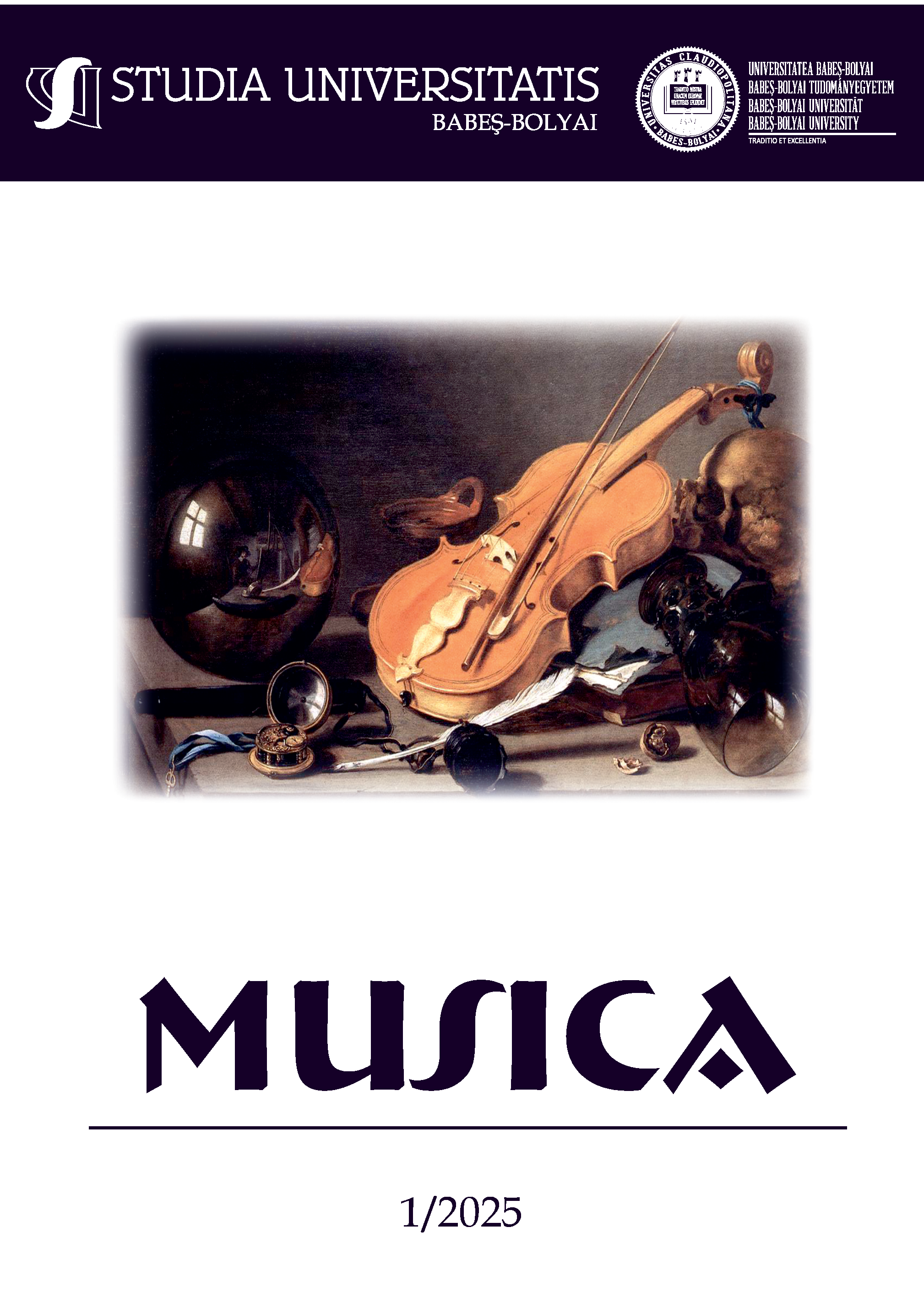Exploring Learning and Unlearning (II): Effective Study Methods for the Individual Practice of Professional Singers
DOI:
https://doi.org/10.24193/subbmusica.2025.1.08Keywords:
learning, unlearning, music education, study methods in singing, time management, vocal pedagogy, creativity in vocal trainingAbstract
Education today no longer means just memorizing information and mastering technical procedures. Education today means exploring and discovering as many things as possible from diverse fields that can shed new light on your own field of interest. Education is more creative today, and is now accessible worldwide, just a click away. But discernment in choosing the valuable paths and what we do with the extensive information we acquire; the power to create a coherent structure, the adaptability and the energy to combine training with a broad vision – these are skills that will make the difference in education. The future belongs to those who will never stop learning[1] - this modern mindset is like a motto for my articles on learning and unlearning. This article attempts to outline why individual study is a necessity for singers as it has always been but must be structured by a clear methodology in which each participant is also a co-author. Because each artist presents his uniqueness – benefiting from anatomical-physiological and psychological particularities – the study methods are permanently adapted to everyone. A good teacher knows and practices these permanent adjustments of his pedagogical manner to effectively respond to the needs of each young singer in training. But the singer in his individual practice also needs to become aware of the benefits of a progressive adaptation and particularization of his personal training. And to periodically review the correctness of his vocal technique, of his artistic perspective, using tools such as unlearning and re-learning. This mental flexibility, combined with an analytical and conscious study – can lead to a more efficient education and good training for young singers. The structure of the article includes topics such as: Effective study methods for professional singers; Singer’s individual practice in approaching a new musical score; Unlearning Tasks; Creativity in vocal training; Time Management for Singers.
[1] Simon, Stefania, The Future Belongs to Those Who Never Stop Learning, Minimalist Brain, Medium, 2021.
References
1. Campbell, Ross, Singing – An extensive Handbook for All Singers and Their Teachers, Novordium Limited UK, 2017.
2. Crocco, Laura; McCabe, Patricia; Madill, Catherine, Principles of Motor Learning in Classical Singing Teaching, Journal of Voice, Volume 34, Issue 4, July 2020, p. 567-581.
3. Ericsson, Anders, Peak: Secretele performanței de top și noua știință a expertizei (original title: Peak: Secrets from the New Science of Expertise), Ed. Publica, Bucharest, 2016.
4. Garcia, Hector (Kirai); Miralles, Francesc, Metoda Ikigai, secrete japoneze pentru a-ți descoperi adevărata pasiune și a-ți atinge țelurile în viață (original title: Ikigai, The Japanese Secret to a Long and Happy Life), Ed. Humanitas, Bucharest, 2019.
5. Gill, Brian P; Herbst, Christian T., Voice Pedagogy – What do we need? Logoped Phoniatr Vocol. 2016 Dec;41(4):168-73. DOI:10.3109/14015439.2015.1079234. Epub 2015 Nov 23. PMID: 26593055.
6. Ginsborg, Jane, Classical Singers Learning and Memorising a New Song: An Observational Study, Psychology of Music, 2002, 30, p. 58-101.
7. Gladwell, Malcom, Excepționalii: Povestea succesului (original title: Outliers: The Story of Success), Ed. Publica, Bucharest, 2009.
8. Harari, Yuval Noah; Brand, Russell, The Future of Education, Penguin Talks, 2018.
9. Hary, Judit, Vocal pedagogy - reflections on how to teach proper speaking and singing to students, Studia UBB Musica, LXVIII, 2, 2023 (p. 207 – 218), DOI: 10.24193/subbmusica.2023.2.15
10. Kiik-Salupere, Vaike; Ross, Jaan, Two Complementary Aspects of Contemporary Vocal Pedagogy, Problems of education in the 21st century, Volume 20, 2010, p. 93-103.
11. Latham, Katherine; Messing, Barbara; Bidlack, Melisa, Vocal Health Education and Medical Resources for Graduate-Level Vocal Performance Students, Journal of Voice, Volume 31, Issue 2, March 2017, Pages 251.e1-251.e7
12. Radu, Cristina, O viziune modernă asupra formării cântărețului de operă (A modern perspective on training the opera singer), Ed. Muzicală, București, 2017.
13. Radu-Giurgiu, Cristina, Exploring Learning and Unlearning in Singing Technique (Breath), Studia UBB Musica, LXVIII, Special Issue 2, 2023 (p. 181 – 196), DOI: 10.24193/subbmusica.2023.spiss2.11.
14. Radu, Cristina, Metode de studiu pentru tinerii cântăreți. Note de curs pentru anii I-IV IMC Licență (Study Methods for Young Singers), Ed. Ikono, Brașov 2024.
15. Simon, Stefania, The Future Belongs to Those Who Never Stop Learning (content of this article was adapted and translated with permission from the Romanian Podcast - Mind Architect, by Paul Olteanu, Season 2, Episode 4 - Why the future belongs to those who do not stop learning), Minimalist Brain, Medium, 2021.
16. Wilson, L. C. Bel Canto to Punk and Back: Lessons for the Vocal Cross-Training Singer and Teacher (Doctoral dissertation, University of South Carolina), 2019. Retrieved from https://scholarcommons.sc.edu/etd/5248
17. Zan, Luiza; Drăgulin, Stela, Vocal improvisation – a cognitive and a psychological process, Studia UBB Musica, LXVIII, Special Issue 2, 2023 (p. 207 – 218), DOI: 10.24193/subbmusica.2023.spiss2.13
Downloads
Published
How to Cite
Issue
Section
License
Copyright (c) 2025 Studia Universitatis Babeş-Bolyai Musica

This work is licensed under a Creative Commons Attribution-NonCommercial-NoDerivatives 4.0 International License.



